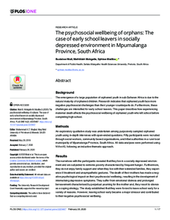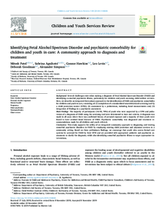Displaying 91 - 100 of 518
The present study of children’s caregivers involved in child welfare examined the factors associated with their receiving services for substance use.
The primary aim of this chapter is to outline the significance of trauma in the lives of parents involved in the child protection system who are sent for forensic psychological evaluations.
This paper describes how experiencing maternal death affects the psychosocial wellbeing of orphaned youth who left school before completing high school.
This article focuses on the lived experiences of orphaned learners and their perspectives relating to the support offered by the School-Based Support Team (SBST) within schools, in two education districts of the Free State province, South Africa.
This toolkit is designed for the social service workforce in need of basic counseling skills. It includes mini lessons that teach fundamental counseling skills and activities and worksheets to provide opportunity to practice the skills.
This chapter from 'Addressing Multicultural Needs in School Guidance and Counseling' focuses on the psychological and social issues that orphans and other vulnerable children experience when their parents are no longer alive.
The following evaluation looks at a dialectical behavioural therapy (DBT) skills group implemented with young females in a Scottish residential service.
The current randomized control study aimed to determine, if a life skills-based intervention could improve the emotional health and self-esteem among Malaysian adolescents in orphanages.
This article describes an integrated three-phase approach to the identification of Fetal Alcohol Spectrum Disorder (FASD) and psychiatric comorbidity for children and youth in care, consisting of: (1) completion of a standardized neurobehavioral screening tool by a child protection worker (CPW); (2) assessment by a pediatrician, including facial measurements and; (3) integration of findings in a psychiatric assessment.




